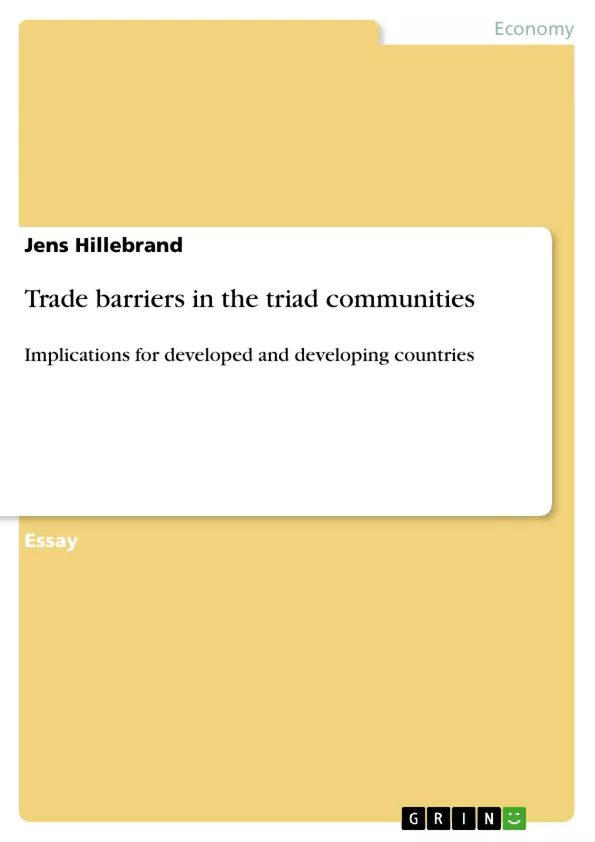Trade barriers are closely linked to, if not a direct consequence of, the practice of international trade. Thus, in order to present the context in which this paper will argue, it will start by introducing international trade as a branch of economics, briefly outline its history and contrast a number of common economic theories. Some of these advocate free multilateral trade as a means to generate greater welfare for all participants whereas others see trade barriers as a necessity. The historical and theoretical overview will lead to the description of today’s status quo in international trade relations. Building upon the illustration of the triad’s role in contemporary international business the study will turn towards the discussion of the implications of trade barriers in the triad communities and examine if their reduction would be beneficial or unfavourable. Thereto trade barriers in the three economic blocs of the triad and their rationale will be presented first. The study will then proceed by highlighting the effects of these trade barriers on developing countries, on the applying countries themselves and on other members of the triad. In doing so the study will contrast the trade barriers’ potential benefits with the costs they might inhere. Finally the study will discuss environmental as well as ethical aspects of the trade barriers.
Evaluating and concluding on the trade barriers’ implications the study will emphasise the overweighing benefits of a drastic reduction of trade barriers in the triad nations and evaluate the likeliness of such a trade liberalisation.
Inhaltsverzeichnis (Table of Contents)
- INTRODUCTION
- HISTORY OF INTERNATIONAL TRADE
- TRADE BARRIERS IN THE TRIAD
- EFFECTS ON DEVELOPING COUNTRIES
- EFFECTS ON TRIAD MEMBERS
- ENVIRONMENTAL AND ETHICAL ASPECTS
- EVALUATION AND CONCLUSION
Zielsetzung und Themenschwerpunkte (Objectives and Key Themes)
This paper examines the implications of trade barriers in the triad communities, specifically focusing on their effects on both developed and developing countries. It analyzes the rationale behind these barriers, their potential benefits and costs, and considers environmental and ethical aspects.
- History and evolution of international trade
- The role of trade barriers in the triad communities
- Impacts of trade barriers on developing countries
- Impacts of trade barriers on triad members
- Environmental and ethical considerations
Zusammenfassung der Kapitel (Chapter Summaries)
- Introduction: The paper sets the stage for the discussion by introducing international trade as a branch of economics and outlining its history and contrasting various economic theories.
- History of International Trade: This chapter traces the evolution of international trade from ancient times to the establishment of the World Trade Organization (WTO), highlighting key economic theories and their impact on trade policies.
- Trade Barriers in the Triad: This chapter explores the rationale behind trade barriers in the triad communities, highlighting the argument for protecting young industries and the use of protectionist measures by developed countries. It examines the example of the United States' "Section 201 Steel Safeguard Measures" implemented in 2002.
Schlüsselwörter (Keywords)
The primary focus of this study is on international trade, trade barriers, the triad communities (United States, European Union, and Japan), developing countries, and the implications of trade policies on both developed and developing economies. It also considers environmental and ethical aspects related to trade barriers.
- Citar trabajo
- Jens Hillebrand (Autor), 2005, Trade barriers in the triad communities, Múnich, GRIN Verlag, https://www.grin.com/document/87792



